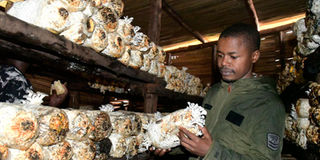How mixed farming changed Kasajja’s fortune

What you need to know:
- Most of the networks turn out to be customers for farm inputs like planting materials and foodstuffs. His biggest farming mistake is being over ambitious. He invested in some crops that turned out to be unprofitable or not suitable for the areas where he has land.
- From that, he has learnt the lessons of always carrying out research on every crop he intends to venture into. With the disruptions of Covid-19, targeted markets like hotels has momentarily been put on hold.
When Axam Kasajja failed to find a job in corporate Uganda, he turned to his father to share the frustration. The frustration motivated Kasajja’s father to provide his son with an interest free loan of Shs100m. With this money Kasajja bought his first five-acre piece of land in Kakiri, Wakiso District.
Starting
There he planted bananas, 50,000 pineapples, 800 fruit trees, reared 15 goats, two cows, 10,000 chicken layers, some sheep and turkeys.
That was in 2009, a year after acquiring a bachelor’s degree in Development Studies from Nkumba University. He was inspired by the story of Judith Kiiza, a prominent farmer in Masaka District who President Museveni had just visited and applauded for a job well done in agriculture.
11 years on, Kasajja has stayed the course of investing, re-investing money and time to make his agricultural journey commercially viable.
Market
At 4am his truck full of agricultural produce is parked at Busega market, on Masaka road.
As he supervises young men offloading 350 bunches of matooke, around 20,000 pineapples, some eight bags of cassava, sweet banana, sweet potatoes among other produce, he haggles with the market traders for the fairest price.
His phone rings and he immediately picks it to give instructions to a storekeeper in Kibuli, where he operates a produce business of a maize and rice mill.
The fresh produce is from his gardens in Mityana.
Fortunes
Over the decade long engagement in agriculture, Kasajja confirms he has grown the enterprise to a Shs10b portfolio.
How have you been able to grow and expand your farming endeavours over the years? Seeds of Gold asks.
“Research, persistence and book keeping. I handle the loans by paying promptly and keeping my financiers updated on good and bad events. I handle my finances through professional book keeping and audit,” he explains.
In regard to financing in agriculture, Kasajja says most banks are not comfortable because of the risks involved such as climate change which are unpredictable.

Kasajja adds value to maize and earns more. Photos by Edgar R Batte
Mixed farmer
He employs more than 200 workers, up from 55 he employed in 2009; veterinary doctors, drivers, riders, engineers, auditors and bankers.
He grows maize on 300 acres, bananas on 50 acres, pineapples 100 acres, citrus fruits 100 acres, coffee on one square mile, eucalyptus, on three square miles, sugarcane 70 acres and also preserves a natural forest cover on land boundaries.
He chose the crops because they are flexible and marketable. He is also into husbandry with 500 heads of livestock.
At his home in Kibuli, Kasajja keeps more than 5,000 birds (both layers and broilers).
He has sales points in Ndeba, Kibuli, Kamwokya, Nansana, Maganjo and Bweyogerere. In order not to get cheated, all produce is recorded before leaving the farm and he is always personally around during harvest.
Value addition
Many machines are involved, including lorries, tractors, motorbikes, milling machines, solar equipment, water pumps and irrigation equipment. The mixed farmer adds value to maize by milling posho and coffee by crushing husks and selling the beans.
Most of the networks turn out to be customers for farm inputs like planting materials and foodstuffs. His biggest farming mistake is being over ambitious. He invested in some crops that turned out to be unprofitable or not suitable for the areas where he has land.
From that, he has learnt the lessons of always carrying out research on every crop he intends to venture into. With the disruptions of Covid-19, targeted markets like hotels has momentarily been put on hold.
“The challenge of most people staying home has led to the need to invest in motorbikes to make door-to-door deliveries. Also, the scarcity of money within populace causing reductions in amount of food consumed and decreased demand for luxury foods such meat, chicken and eggs,” says the 38-year-old farmer.
Expansion
He says he is adapting by widening market scope to areas outside Kampala as well as price reduction to make the produce affordable for the struggling population.
That has called for resilience, persistence, innovation, creativity and desire to learn new technologies from resource avenues like smart money issuance and agricultural expos, getting in touch with consultants from Naads and district agricultural officials.
He occasionally visits and seeks advice from mentors, Dr Judith Kiiza and Dr Emma Naluyima. He says following market trends has also been helpful, for example, every morning he seeks to know the price of maize and coffee, both in towns and villages, and other products “My wish is full mechanisation of all farm units and value additions to all products. I plan to achieve my plans through savings, borrowing from banks, my father and seeking government support initiatives like Naads and districts agricultural departments,” he reveals.
He adds that agricultural prices are prone to fluctuation. He attributes this to human or natural disasters such as covid-19, the level of production; when a crop harvested in huge sums around the country prices go down and vice versa.




